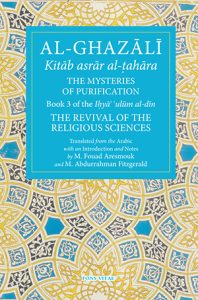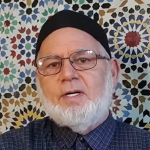Al-Ghazali The Mysteries of Purification (Ihya Ulumuddin Series No. 3)

Author: Imām Al-Ghazali
Translator: M. Fouad Aresmouk & M. Abdurrahman Fitzgerald
Publisher: Fons Vitae Publishing
Year of Publication: 2017
Print Length: 112 pages
Genre: Islamic Studies / Quranic Studies; Theology, Ethics and Philosophy; Islamic Law & Jurisprudence, Science; Qur’anic Reflection, Supplication & Prayers; Non-Fiction / Religious Studies
Topic: Islam, Qur’an, Pillars of Islam, Islamic Pillars of Faith
In The Mysteries of Purification (Kitab asrar al tahara), the third of the forty books of the Revival of the Religious Sciences (Ihya’ ‘ulum al-din), Abu Hamid al-Ghazali explains the fundamentals of the purification that is necessary in order to perform the five daily prayers.
Table of Contents
Editor’s Note
Biography of Imām al-Ghazālī
About the Revival of the Religious Sciences
Translator’s Introduction: General Arrangement / The Rite of Ablution in Islam / Purification of the Body and the “Physicality” of Islam / The “Mysteries” of Purification / Passages from the Qūt al-Qulūb / Our Work / Acknowledgments
The Mysteries of Purification
Author’s Instroduction
Chapter 1
On Purification from Impurities
1. What Is to be Removed—Impurities Are of Three Sources: Inanimate [Things], Living Creatures, and Parts of Living Creatures
2. On the Solid and Liquid Substances Used to Remove Impurities
3. On the Ways of Removing Impurity
Chapter 2
Purification from the Occurrences that Remove Purity
On the Manners Related to Answering the Call of Nature
How to Wipe after Urination or Defecation
How to Perform the Lesser Ablution (wuḍū’)
The Meritorious Qualities of the Lesser Ablution
How to Perform the Greater Ablution
How to Perform the Dry Ablution (tayammum)
Chapter 3
Cleaning What Adds to the Body Externally
Concerning the Bathhouse
On the Sunna Practices [Relating to the Bathhouse], These Number Ten
The Second Kind of Substances [to be Removed] from the Body are What Grows from It and These Number Eight
Chapter 4
Practices That Are Disapproved of Concerning the Beard
Appendix: Supplications Quoted in the Mysteries of Purification
Indexes: Index of Qur’ān Verses / Index of Hadīth / Index of Names and Places / Subject Index
About the Translators

Imām Abu Hamid al-Ghazali is a 11th century Muslim scholar. He was one of the most prominent and influential philosophers, theologians, jurists, and mystics of Sunni Islam. Al-Ghazālī was born at Ṭūs (near Mashhad in eastern Iran) and was educated there, then in Jorjān, and finally at Nishapur (Neyshābūr), where his teacher was al-Juwaynī, who earned the title of imām al-ḥaramayn (the imam of the two sacred cities of Mecca and Medina). He was active at a time when Sunni theology had just passed through its consolidation and entered a period of intense challenges from Shiite Ismâ’îlite theology and the Arabic tradition of Aristotelian philosophy (falsafa). Al-Ghazâlî understood the importance of falsafa and developed a complex response that rejected and condemned some of its teachings, while it also allowed him to accept and apply others. His great work, Iḥyāʾ ʿulūm al-dīn or Ihya Ulumuddin (“The Revival of the Religious Sciences”), made Sufism (Islamic mysticism) an acceptable part of orthodox Islam.
Source: https://plato.stanford.edu/entries/al-ghazali/
More from Imam al-Ghazali in this library, click here.

M. Fouad Aresmouk is a Moroccan author and translator. He studies books and teachings of the Sufis. He wrote al-Rashad fi zabdati al-Awrad and an instructor of Arabic at the Center for Language and Culture in Marrakech, Morocco.
Source: https://www.barnesandnoble.com/w/the-mysteries-of-the-prayer-and-its-important-elements-michael-abdurrahman-fitzgerald/1128932461
More from M. Fouad Aresmouk in this library, click here.

Michael Abdurrahman Fitzgerald is the Director of the Center for Language and Culture, Marrakech, and the author of several books, including Ibn Qayyim al-Jawziyya on the Invocation of God.
Source: https://www.barnesandnoble.com/w/the-mysteries-of-the-prayer-and-its-important-elements-michael-abdurrahman-fitzgerald/1128932461
More from M. Abdurrahman Fitzgerald in this library, click here.
